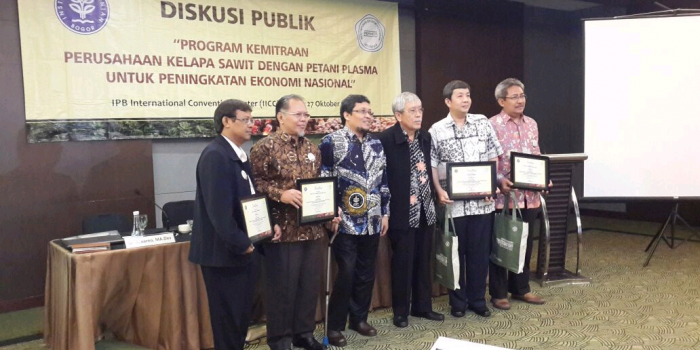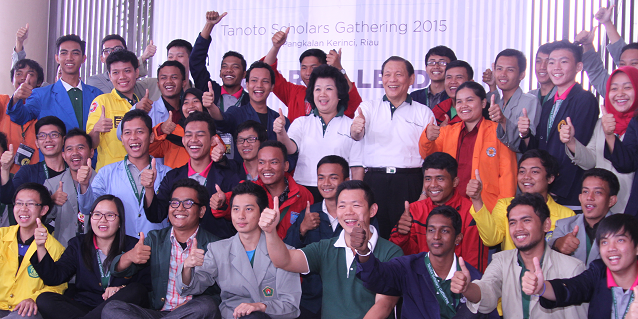The development of the agri business in Indonesia is still being challenged by the poor welfare of smallholders, even when these smallholders are the front liners of the industry who contribute to the country’s national income. One of the ways to increase smallholders’ welfare is to develop a partnership between them and the companies, which has been done by the palm oil industry in Indonesia.
The partnership was discussed in a public discussion event themed “Partnership programs between palm oil companies with smallholders to increase national income” held jointly by the Department of Agri Business, The Faculty of Economics and Management, Bogor Agriculture Institute (IPB) and Indonesian Agriculture Economic Association (PERHEPI) at IPB National Convention Center (IICC) in Bogor, Indonesia on 27 October 2014. Bustanul Arifin, the head of PERHEPI, professor of agriculture economics in UNILA and a senior economist from INDEF, explained that smallholders are often disadvantaged in the agriculture industry. Smallholders living in rural areas are often discriminated against and treated unfairly. For example, smallholders do not have the authority to determine the pricing of their agriculture products and are forced to accept prices set by the broker (because of dualism). A partnership scheme, said Bustanul, shows how companies and smallholders cooperate with each other to increase production of the smallholders’ land. ”The partnership model has been developed by palm oil companies in Indonesia. Through the partnership, smallholders are given transparent access to the process of price setting and therefore avoid any price discrimination. In addition, smallholders also receive trainings on good plantation management. Through a good partnership model, the national economy can receive the stimulus it needs to continue growing,” said Bustanul. According to a research done by Syahza (2009), the multiplier effect of palm oil in Riau Province is 3.03 which means that an investment of Rp 1 will increase the income up to Rp 3.03. At the international scale, palm oil export has become one of the largest non-oil and gas commodities reaching USD 15.8 million in 2013 or around 8.7% of Indonesia’s total export (UN Comtrade, 2014). In the same event, the Executive Director of Association of Indonesian Palm Oil Producers (GAPKI), Fadhil Hasan highlighted that Indonesian palm oil companies have developed a partnership with the smallholders since a long time ago. Through this partnership, smallholders receive trainings on how to increase the production of their plantation. ”As the main commodity in Indonesia, palm oil industry needs to address challenges on smallholders’ welfare. The partnership scheme between smallholders and companies developed by the industry has been proven to bring business advantage while also increases smallholders’ prosperity,” said Fadhil. One of the companies who has been successful in developing a partnership program with smallholders is
Asian Agri. The company was an early adopter of the program since 1987. Now, Asian Agri’s partnership covers an area of 60,000 ha and supports 29,000 smallholders and their families. Asian Agri General Manager, Freddy Wijaya, explained that through the partnership, the company has been providing trainings on sustainable plantation management such as trainings on how to manage palm oil plantation sustainably to optimize production, how to use fertilizers effectively and efficiently, and entrepreneurship skills to gain additional income outside of their plantation. ”Nucleus plasma scheme partnership implemented by Asian Agri has been successfull in increasing the welfare and living condition of smallholders and their family. At the same time, this partnership which puts emphasis on the environment also brings business advantage due to better quality of farmer’s production results that are well accepted in the international market,” said Freddy Wijaya. The Head of Indonesia Agribusiness Association, and a lecturer in Department of Agribusiness IPB, Suharno said that the partnership program by Asian Agri is a business model applicable in other agribusiness industries, not only in palm oil. He also added that the partnership is a collaboration between big and modern business companies with small agribusiness entities that has the potential to address a variety of issues faced by the industry in Indonesia such as the uncertainty of market access for smallholders, pricing of palm oil products, and community and rural welfare. Click
here for more information on this public discussion event (in Bahasa Indonesia).
About Asian Agri
Asian Agri is an Indonesian-based, world-class palm oil company that manages the archipelago’s abundant natural resources. It was established in 1979. Asian Agri was one of the pioneers in the Indonesian government’s trans-migration scheme in Riau and Jambi. The scheme involved the migration of Indonesians from densely populated areas of Indonesia, such as Java, to less populous areas of the country with the objective of reducing poverty. Under the scheme, migrants were given land. In partnership with companies like Asian Agri which provided training in palm oil cultivation, seedlings, financing and community services, these migrants became successful smallholders, supplying their palm oil produce to Asian Agri at fair trade prices in line with government policy. Asian Agri is part of a group of companies managed by RGE, which is founded by Sukanto Tanoto, also its chairman.






